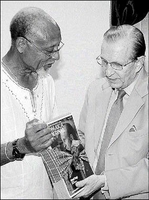
Professor Barry Chevannes (left), chairman, Institute of Jamaica (IOJ), presents copies of the book to Edward Seaga at the launch of Jamaica Journal volume 32, in commemoration of the 130th anniversary of the IOJ, on Sunday, August 23. - Winston Sill/Freelance Photographer
Title: Jamaica Journal - Vol 32, Nos 1-2
Publisher: Institute of Jamaica
Reviewer: Paul H. Williams
To commemorate its 130th anniversary, the Institute of Jamaica (IOJ) has dedicated this special issue to Edward Seaga, ON, PC, former prime minister of Jamaica, who "was the person responsible for starting Jamaica Journal". An in-house note says, inter alia, "It is fitting that we acknowledge Mr Seaga's role in the journal's creation. In recognition of his pre-eminence in institutional building in the field of cultural heritage, Mr Seaga was installed as a fellow of the Institute of Jamaica on May 1, 2006."
The citation, written by Professor Rex Nettleford, OM, OCC, himself a fellow at the IOJ, and read at the installation ceremony, is reproduced on page 9. The opening paragraph reads: "The Institute of Jamaica accepts into its community of fellows, the Most Honourable Edward Philip George Seaga, ON, a former prime minister of Jamaica, public servant extraordinaire, distinguished fellow of the University of the West Indies, and an eminent and seminal contributor to arguably the most enduring, the most effective and the most positively impactful element in the growth and development of the Jamaican people in the post colonial period of Jamaica's still burgeoning history."
recognition
In his response, called 'A Life on a Cultural Mission', Seaga opens by saying, "My installation as a fellow of the Institute of Jamaica, a rare honour, is an occasion which will have a special place in my heart because it is in recognition of the work that I love most, cultural development, and it goes back to the starting point of my career."
This is followed by the poem, 'River Maid, River Maid', written by Seaga, and was a gold medal-winner in the 1969 Festival Literary Competition. It was originally published in Jamaica Journal 3, No. 2 in 1969. "The poem relates the possession experiences of a river maid, one of the functionaries of Pocomania Revival; under possession, she confronts and deals with hostile water spirits who impede the spiritual journey of possessed brethren through a river, her spiritual territory. The ritual dance of the river maid is performed against the heavy rhythmic breathing, guttural groaning, singing and chanting (cymbaling) of possessed brethren," the introductory note says.
The information gets even mystical with Clinton Hutton's The Revival Table - Feasting with the Ancestors and Spirits. Drawing on his childhood memories and his extensive research, Hutton has given an elaborate insight of Pocomania Revivalism and the 'Table' that is so central to its operations.
"The Revival Table, which seems to combine the feeding of the ancestral spirits (ground) spirits, as I observed my mother and her friend doing when I was a boy, with the feeding of deifical spirits (i.e. heavenly spirits and earthbound spirits), is an artistically arranged display of traditional Jamaican dishes which are ritually cooked, usually without salt - especially those which are prepared for the spirits," he says.
"Over the years, I have come across tables of various shapes and sizes. They include the round table, the four-pole table or cross table, and the rectangular table, which can be long or short, and narrow or wide. I have also observed a number of ground tables, all of them circular." And there are some colourful pictures of Revivalism at work to complement the lustre of this most interesting expose.
contribution to literature
Reviews of books by Curdella Forbes (A Permanent Freedom), Milton Wray (Who Am I? The Untold Story of Beenie Man), Kwame Dawes (She's Gone), Mel Cooke (11/9) and Brian Meeks (Envisioning Caribbean Futures: Jamaican Perspectives) are also contained in the issue. On Page 121 is an extract from 'Stele', a story from Forbes' A Permanent Freedom. Four of Mel Cooke's poems are on Page 124. Mawuena Logan's look on Peter Abraham's contribution to literature and Petrine Archer's analysis of Jackie Ranston's Belisario: Sketches of Character also enrich the "books and writers" category.
The lives and works of many outstanding personalities - such as Isaac Barnes, environmental scientist, renowned mineralogist and engineer, writer, musician and theologian; Christopher Gonzalez, master sculptor; Aaron Matalon, businessman and patron of the arts and Jamaican culture; Walter Rodney, black power activist; Wilton Gaynair, international tenor saxophonist; and Sylvia Winter, former Jamaica journalist, writer and newspaper columnist - are also discussed.
hot-button debates
University of the West Indies professor and noted social historian Verene Shepherd, not one to shy away from hot-button debates, asked if there should be a permanent relationship between Sir Anthony Musgrave and the Institute of Jamaica. The Musgrave medals given annually by the IOJ to outstanding Jamaicans in their respective fields were named for Sir Anthony, governor of Jamaica from 1877-1883.
Professor Shepherd, also a member of the Jamaica Journal editorial committee, writes, "Even though the award has been in existence in one form or another since 1897 (with annual awards since 1889), there are mixed views on the appropriateness of continuing to name such a prestigious award after a colonial governor, one who represented the British monarchy during the years of Crown colony government when there was no local representation in government in the island."
Shepherd's essay is a must-read. It, along with the other contents, some not mentioned in this review, has made this particular issue of Jamaica Journal rich, colourful and educational. A souvenir volume it is!